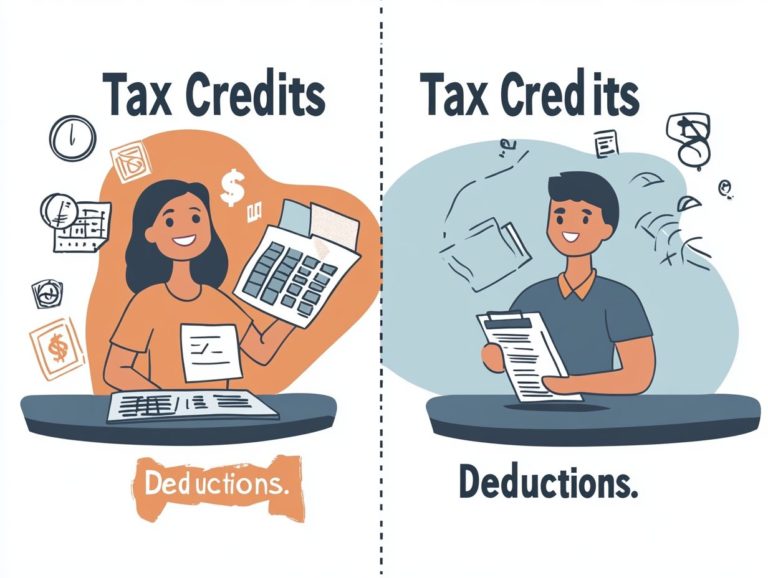Best Personal Finance Books to Read?
Are you ready to take charge of your finances and pave the way to a more prosperous financial future? Navigating the realm of personal finance might feel overwhelming, but with the right guidance, you can transform your journey.
This article presents a curated selection of the finest personal finance books, each packed with valuable insights, practical tips, and effective strategies. From timeless wealth-building classics to contemporary essentials, these titles will empower you to make informed decisions about your money.
Dive in and uncover your next great read!
Contents
- Key Takeaways:
- Best Personal Finance Books to Read?
- 1. Rich Dad, Poor Dad by Robert Kiyosaki
- 2. The Total Money Makeover by Dave Ramsey
- 3. Think and Grow Rich by Napoleon Hill
- 4. The Millionaire Next Door by Thomas J. Stanley and William D. Danko
- 5. I Will Teach You to Be Rich by Ramit Sethi
- 6. The 4-Hour Work Week by Timothy Ferriss
- 7. The Little Book of Common Sense Investing by John C. Bogle
- 8. The Automatic Millionaire by David Bach
- 9. Your Money or Your Life by Vicki Robin and Joe Dominguez
- 10. The Bogleheads’ Guide to Investing by Taylor Larimore, Mel Lindauer, and Michael LeBoeuf
- 11. The Simple Path to Wealth by J.L. Collins
- 12. The Intelligent Investor by Benjamin Graham
- 13. A Random Walk Down Wall Street by Burton G. Malkiel
- 14. The Richest Man in Babylon by George S. Clason
- 15. The One-Page Financial Plan by Carl Richards
- Frequently Asked Questions
- What are the best personal finance books to read for beginners?
- What are some personal finance books that focus on investing?
- Are there any personal finance books specifically geared towards women?
- Looking for the best budgeting book? Check this out!
- What are some personal finance books that cover the basics of financial planning?
- What personal finance books teach about building wealth and achieving financial independence?
Key Takeaways:

- Develop a strong financial foundation by understanding the principles of money management through books like “Rich Dad, Poor Dad” and “The Total Money Makeover.”
- Expand your knowledge of investments and wealth building with books such as “Think and Grow Rich” and “The Little Book of Common Sense Investing.”
- Take control of your financial future by learning practical strategies from books like “I Will Teach You to Be Rich” and “The Automatic Millionaire.”
Best Personal Finance Books to Read?
Selecting the best personal finance books is essential for anyone who aims to achieve financial success and understand money especially in today’s world, where financial understanding is more crucial than ever. You’ll find these books packed with insights that can change your financial life!
By exploring topics such as eliminating debt, building family wealth, and achieving financial independence, these resources are your key to taking charge of your financial future now!
Personal finance books also cover retirement planning, tax strategies, and the psychology of money, offering you a comprehensive view of financial health. Additionally, you can discover the top 10 personal finance blogs to follow for more insights. Authors like Dave Ramsey, known for his debt snowball method, a strategy for paying off debts from smallest to largest, and Suze Orman, who provides straightforward advice, resonate with readers from all walks of life.
Robert Kiyosaki s teachings on financial education introduce key concepts surrounding assets and liabilities, inspiring you to think critically about your financial choices. By engaging with these expert insights, you can cultivate your financial acumen and enhance your ability to make sound economic decisions.
1. Rich Dad, Poor Dad by Robert Kiyosaki
In “Rich Dad, Poor Dad,” Robert Kiyosaki shares valuable insights into understanding money by contrasting the mindsets of his two ‘dads.’ He illustrates principles of wealth-building that can pave your way to financial success.
Through engaging narratives, he emphasizes the importance of financial education, urging you to grasp the distinction between assets and liabilities. Instead of accumulating liabilities that look like assets, he champions investments that generate passive income streams.
Kiyosaki s teachings encourage you to shift from the conventional paycheck-to-paycheck grind to one that actively seeks opportunities for financial growth. By exploring alternative investment strategies, such as real estate or entrepreneurship, you can embark on a journey toward greater financial independence and security, reshaping your economic destiny.
2. The Total Money Makeover by Dave Ramsey
Dave Ramsey s “The Total Money Makeover” provides a detailed roadmap for attaining financial stability, filled with practical budgeting insights and effective strategies for eliminating debt.
By introducing the concept of “baby steps,” this plan transforms the often daunting journey to financial peace into a series of manageable actions anyone can take. These steps guide you from establishing a modest emergency fund to systematically tackling debt, all while building wealth over time.
Embracing these changes in your financial habits can be a life-altering experience. It s not just about education; it s also crucial to stay accountable. Surrounding yourself with supportive peers or financial coaches can enhance your commitment and cultivate a mindset dedicated to achieving and sustaining your financial aspirations.
Start your financial journey today and explore the transformative insights from these essential books!
3. Think and Grow Rich by Napoleon Hill
Napoleon Hill’s “Think and Grow Rich” stands as a timeless classic, offering you transformative principles that pave the way to financial success and nurture a prosperous money mindset!
At the heart of Hill’s philosophy is the concept of desire. He emphasizes that an intense ambition for wealth and fulfillment is crucial for manifesting your desired reality. Persistence is another key element he highlights. Unwavering determination in the face of obstacles can lead to extraordinary achievements.
Consider the story of Thomas Edison, who encountered numerous failures before successfully inventing the light bulb. His tenacity is a true embodiment of these teachings.
Hill also champions a positive mental attitude, a mindset that countless successful entrepreneurs, including Oprah Winfrey, have leveraged to realize their dreams and establish influential legacies. By internalizing these principles, you can unlock the exciting doors to your own financial freedom and abundance!
4. The Millionaire Next Door by Thomas J. Stanley and William D. Danko
In “The Millionaire Next Door,” authors Thomas J. Stanley and William D. Danko delve into the financial habits of America’s wealthy. They unveil essential strategies for accumulating wealth over time.
They illustrate that millionaires often embrace a striking frugality. They prefer saving money rather than spending on things they don t really need. Unlike those who fall victim to lifestyle inflation, these individuals prioritize saving over immediate indulgence.
Their investment strategies are carefully crafted, focusing on diversified portfolios and long-term growth rather than chasing after speculative trends. This disciplined approach to financial planning not only fortifies their wealth but also offers stability amid economic ups and downs.
For anyone aspiring to achieve financial independence, adopting these wise habits and strategies can serve as a vital roadmap. It prompts a thoughtful reassessment of personal spending and investment practices, and exploring the best personal finance podcasts can provide valuable insights and guidance.
5. I Will Teach You to Be Rich by Ramit Sethi

Ramit Sethi s I Will Teach You to Be Rich serves as your modern guide, meticulously crafted for young adults. It seamlessly blends practical money management techniques with an enabling focus on financial confidence.
Through a series of actionable strategies, Sethi encourages you to seize control of your finances by mastering the essentials of budgeting, saving, and investing. He also emphasizes grasping the nuances of credit scores.
He adopts a holistic approach to financial health, underscoring the significance of not just chasing immediate gains. It’s also about laying the groundwork for long-term wealth-building.
With his straightforward methods, you ll find it easier to cultivate lasting financial habits. These habits enable you to navigate the complexities of personal finance with clarity and purpose.
His guidance helps anyone seeking a sustainable path to financial stability and growth.
6. The 4-Hour Work Week by Timothy Ferriss
Timothy Ferriss’s The 4-Hour Work Week challenges your traditional views on work and financial freedom. It offers innovative consumerism tactics and lifestyle design strategies that help you break free from the 9-to-5 grind.
In this groundbreaking work, Ferriss invites you to embrace a new way of thinking that values experiences over mere wealth accumulation. By leveraging automation and outsourcing, you can simplify your daily tasks and focus on what genuinely matters to you.
His approach encourages you to craft a life rich with choices. This allows for more personal freedom while generating income.
With practical techniques and captivating narratives, he inspires you to rethink your relationship with money. Financial independence isn t just a distant fantasy; it s a reality you can achieve today with thoughtful planning and decisive action.
7. The Little Book of Common Sense Investing by John C. Bogle
In ‘The Little Book of Common Sense Investing,’ John C. Bogle champions straightforward yet powerful investment strategies, focusing on low-cost index funds as a reliable route to financial success.
He asserts that markets are generally efficient, which makes it hard to beat the market consistently. Instead, you’re encouraged to embrace diversification, which helps mitigate risks by spreading your investments across various asset classes.
With a long-term investment perspective, Bogle emphasizes the remarkable power of compounding returns. Small, steady growth can transform into substantial wealth over time.
This philosophy resonates with those like you who aspire to build a solid financial foundation, urging you to make informed investment choices that focus on sustainability rather than fleeting short-term gains.
8. The Automatic Millionaire by David Bach
David Bach’s ‘The Automatic Millionaire’ shows you how to automate your savings and investment strategies, demonstrating that building wealth is within reach for everyone, no matter their income level.
By promoting an easy system that saves you time, the book effectively addresses common financial pitfalls like overspending and procrastination. Automating your finances encourages you to prioritize saving before spending, fostering a mindset focused on long-term stability.
Establishing good financial habits early such as setting up automatic transfers to savings accounts or retirement funds ensures that you can build a secure future without the ongoing stress of budgeting. This approach streamlines your financial process and instills a sense of confidence, allowing you to navigate life s uncertainties with greater ease.
9. Your Money or Your Life by Vicki Robin and Joe Dominguez
In “Your Money or Your Life,” Vicki Robin and Joe Dominguez take you on a journey to financial peace while aligning your spending with your core values.
They offer a refreshing perspective on the relationship between time and money, showing that each dollar spent takes away from your life energy. This book encourages you to track your expenses diligently, illuminating areas where you might be unwittingly wasting resources.
By challenging conventional consumerist beliefs, it prompts you to reflect on your purchases and prioritize what genuinely enhances your life. The insights within advocate for mindful financial decisions that cultivate a healthier relationship with money and pave the way for a sustainable and fulfilling lifestyle.
10. The Bogleheads’ Guide to Investing by Taylor Larimore, Mel Lindauer, and Michael LeBoeuf
The Bogleheads’ Guide to Investing gives you a strong grasp of investing fundamentals, championing a philosophy that prioritizes simplicity and long-term growth.
By following key principles like effective asset allocation, you can better manage risk while enhancing your potential for returns. The guide encourages you to minimize costs through low-fee investment options, ensuring that more of your money works for you instead of being squandered on excessive fees.
Embracing passive investing ideals allows you to sidestep the traps of attempting to outsmart the market, leading to more consistent performance over time. Together, these strategies enable you to navigate the challenges of investing, instilling a sense of security and confidence in your investment journey.
11. The Simple Path to Wealth by J.L. Collins

“The Simple Path to Wealth,” by J.L. Collins, simplifies complex investment strategies into clear advice. This guidance aims to lead you to financial freedom.
Collins shows how investing in the stock market can build long-term wealth. He champions low-cost index funds to minimize fees and maximize returns.
By using these funds, you can benefit from overall market growth rather than chasing individual stocks. Chasing stocks often leads to frustration and disappointment.
Success stories from readers prove that applying these strategies can lead to substantial financial independence. You can take charge of your financial future by making informed choices and practicing disciplined habits.
12. The Intelligent Investor by Benjamin Graham
Benjamin Graham’s The Intelligent Investor is a cornerstone of investment literature. It offers timeless principles for building wealth.
Graham introduces you to value investing. He encourages you to find undervalued stocks with good growth potential.
He stresses the importance of having a safety buffer this protects you from unexpected market changes. This mindset builds financial resilience and alleviates stress.
His insights have shaped countless investors, including Warren Buffett. This shows that a thoughtful approach to investing can lead to lasting prosperity.
13. A Random Walk Down Wall Street by Burton G. Malkiel
Burton G. Malkiel’s “A Random Walk Down Wall Street” makes a strong case for market efficiency. He encourages you to use straightforward investment strategies.
Malkiel examines different investment options stocks, bonds, and real estate. He shows how they can work together in a balanced portfolio.
Emphasizing diversification and a long-term outlook gives you essential tools for navigating investments. His insights help you make choices aligned with your risk tolerance and goals.
14. The Richest Man in Babylon by George S. Clason
George S. Clason’s ‘The Richest Man in Babylon’ shares financial wisdom through engaging parables. These lessons on wealth-building are timeless.
The stories emphasize saving a portion of your income. This principle is crucial for achieving financial stability.
The narratives also highlight wise investments that can grow your wealth. Financial discipline helps you avoid impulsive spending and focus on your goals.
Today, these lessons are still relevant. They guide you through budgeting, saving for retirement, and making informed investment choices for greater financial security.
15. The One-Page Financial Plan by Carl Richards
Carl Richards’s The One-Page Financial Plan transforms financial decision-making into a streamlined process, guiding you to clearly define your financial goals and lay a robust financial foundation.
Richards underscores the importance of crafting a personal financial vision that aligns with your core values. By simplifying complex processes into manageable steps, he enables you to make informed choices that truly reflect what matters most in your life.
This method deepens your understanding of your current financial situation and strengthens the connection between your daily actions and your long-term aspirations.
When you align your decisions with your personal beliefs, every financial move becomes a meaningful step toward a fulfilling life, where financial stability and personal integrity coexist harmoniously.
Frequently Asked Questions
What are the best personal finance books to read for beginners?

Some great personal finance books for beginners include “The Total Money Makeover” by Dave Ramsey, “I Will Teach You to Be Rich” by Ramit Sethi, and “The Simple Path to Wealth” by JL Collins.
What are some personal finance books that focus on investing?
If you’re looking to learn more about investing, consider reading “The Little Book of Common Sense Investing” by John Bogle, “The Intelligent Investor” by Benjamin Graham, or “A Random Walk Down Wall Street” by Burton Malkiel.
Are there any personal finance books specifically geared towards women?
Absolutely! Don t miss out on these fantastic personal finance books specifically for women, including “Smart Women Finish Rich” by David Bach, “Women & Money” by Suze Orman, and “The Feminist Financial Handbook” by Brynne Conroy.
Looking for the best budgeting book? Check this out!
One highly recommended budgeting book is “Your Money or Your Life” by Vicki Robin and Joe Dominguez. Other popular options include “The Total Money Makeover” by Dave Ramsey and “The 30-Day Money Cleanse” by Ashley Feinstein Gerstley.
What are some personal finance books that cover the basics of financial planning?
For those looking to learn the fundamentals of financial planning and improve their financial literacy, consider reading “Rich Dad, Poor Dad” by Robert Kiyosaki, “The Millionaire Next Door” by Thomas Stanley and William Danko, or “Think and Grow Rich” by Napoleon Hill.
What personal finance books teach about building wealth and achieving financial independence?
Absolutely! Some great personal finance books on building wealth and achieving financial independence include “The Richest Man in Babylon” by George S. Clason, “The Automatic Millionaire” by David Bach, and “The 4-Hour Work Week” by Tim Ferriss, which focus on budgeting advice and investment strategies.






